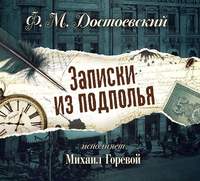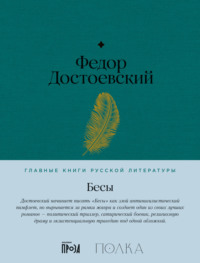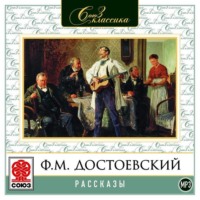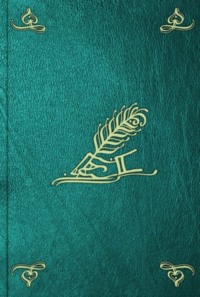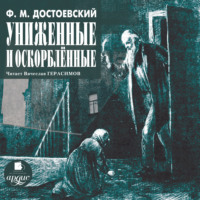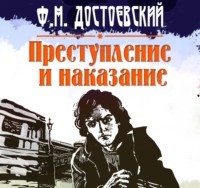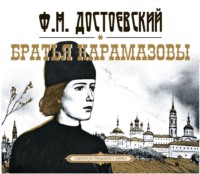 полная версия
полная версияThe House of the Dead: or, Prison Life in Siberia
"Oh, do teach me, I beg of you," said Ali, raising himself up in bed; he joined his hands and looked at me with a suppliant air.
We went to work the very next evening. I had with me a Russian translation of the New Testament, the only book that was not forbidden in the prison. With this book alone, without an alphabet, Ali learnt to read in a few weeks, and after a few months he could read perfectly. He brought to his studies extraordinary zeal and warmth.
One day we were reading together the Sermon on the Mount. I noticed that he read certain passages with much feeling; and I asked him if he was pleased with what he read. He glanced at me, and his face suddenly lighted up.
"Yes, yes, Jesus is a holy prophet. He speaks the language of God. How beautiful it is!"
"But tell me what it is that particularly pleases you."
"The passage in which it is said, 'Forgive those that hate you!' Ah! how divinely He speaks!"
He turned towards his brothers, who were listening to our conversation, and said to them with warmth a few words. They talked together seriously for some time, giving their approval of what their young brother had said by a nodding of the head. Then with a grave, kindly smile, quite a Mussulman smile (I liked the gravity of this smile), they assured me that Isu [Jesus] was a great prophet. He had done great miracles. He had created a bird with a little clay on which he breathed the breath of life, and the bird had then flown away. That, they said, was written in their books. They were convinced that they would please me much by praising Jesus. As for Ali, he was happy to see that his brothers approved of our friendship, and that they were giving me, what he thought would be, grateful words. The success I had with my pupil in teaching him to write, was really extraordinary. Ali had bought paper at his own expense, for he would not allow me to purchase any, also pens and ink; and in less than two months he had learnt to write. His brothers were astonished at such rapid progress. Their satisfaction and their pride were without bounds. They did not know how to show me enough gratitude. At the workshop, if we happened to be together, there were disputes as to which of them should help me. I do not speak of Ali, he felt for me more affection than even for his brothers. I shall never forget the day on which he was liberated. He went with me outside the barracks, threw himself on my neck and sobbed. He had never embraced me before, and had never before wept in my presence.
"You have done so much for me," he said; "neither my father nor my mother have ever been kinder. You have made a man of me. God will bless you, I shall never forget you, never!"
Where is he now, where is my good, kind, dear Ali?
Besides the Circassians, we had a certain number of Poles, who formed a separate group. They had scarcely any relations with the other convicts. I have already said that, thanks to their hatred for the Russian prisoners, they were detested by every one. They were of a restless, morbid disposition: there were six of them, some of them men of education, of whom I shall speak in detail further on. It was from them that during the last days of my imprisonment I obtained a few books. The first work I read made a deep impression upon me. I shall speak further on of these sensations, which I look upon as very curious, though it will be difficult to understand them. Of this I am certain, for there are certain things as to which one cannot judge without having experienced them oneself. It will be enough for me to say that intellectual privations are more difficult to support than the most frightful, physical tortures.
A common man sent to hard labour finds himself in kindred society, perhaps even in a more interesting society than he has been accustomed to. He loses his native place, his family; but his ordinary surroundings are much the same as before. A man of education, condemned by law to the same punishment as the common man, suffers incomparably more. He must stifle all his needs, all his habits, he must descend into a lower sphere, must breathe another air. He is like a fish thrown upon the sand. The punishment that he undergoes, equal for all criminals according to the law, is ten times more severe and more painful for him than for the common man. This is an incontestable truth, even if one thinks only of the material habits that have to be sacrificed.
I was saying that the Poles formed a group by themselves. They lived together, and of all the convicts in the prison, they cared only for a Jew, and for no other reason than because he amused them. Our Jew was generally liked, although every one laughed at him. We only had one, and even now I cannot think of him without laughing. Whenever I looked at him I thought of the Jew Jankel, whom Gogol describes in his Tarass Boulba, and who, when undressed and ready to go to bed with his Jewess in a sort of cupboard, resembled a fowl; but Isaiah Fomitch Bumstein and a plucked fowl were as like one another as two drops of water. He was already of a certain age – about fifty – small, feeble, cunning, and, at the same time, very stupid, bold, and boastful, though a horrible coward. His face was covered with wrinkles, his forehead and cheeks were scarred from the burning he had received in the pillory. I never understood how he had been able to support the sixty strokes he received.
He had been sentenced for murder. He carried on his person a medical prescription which had been given to him by other Jews immediately after his exposure in the pillory. Thanks to the ointment prescribed, the scars were to disappear in less than a fortnight. He had been afraid to use it. He was waiting for the expiration of his twenty years (after which he would become a colonist) in order to utilise his famous remedy.
"Otherwise I shall not be able to get married," he would say; "and I must absolutely marry."
We were great friends: his good-humour was inexhaustible. The life of the convict prison did not seem to disagree with him. A goldsmith by trade, he received more orders than he could execute, for there was no jeweller's shop in our town. He thus escaped his hard labour. As a matter of course, he lent money on pledges to the convicts, who paid him heavy interest. He arrived at the prison before I did. One of the Poles related to me his triumphal entry. It is quite a history, which I shall relate further on, for I shall often have to speak of Isaiah Fomitch Bumstein.
As for the other prisoners there were, first of all, four "old believers," among whom was the old man from Starodoub, two or three Little Russians, very morose persons, and a young convict with delicate features and a finely-chiselled nose, about twenty-three years of age, who had already committed eight murders; besides a band of coiners, one of whom was the buffoon of our barracks; and, finally, some sombre, sour-tempered convicts, shorn and disfigured, always silent, and full of envy. They looked askance at all who came near them, and must have continued to do so during a long course of years. I saw all this superficially on the first night of my arrival, in the midst of thick smoke, in a mephitic atmosphere, amid obscene oaths, accompanied by the rattling of chains, by insults, and cynical laughter. I stretched myself out on the bare planks, my head resting on my coat, rolled up to do duty in lieu of a pillow, not yet supplied to me. Then I covered myself with my sheepskin, but, thanks to the painful impression of this evening, I was unable for some time to get to sleep. My new life was only just beginning. The future reserved for me many things which I had not foreseen, and of which I had never the least idea.
CHAPTER VI. THE FIRST MONTH
Three days after my arrival I was ordered to go to work. The impression left upon me to this day is still very clear, although there was nothing very striking in it, unless one considers that my position was in itself extraordinary. The first sensations count for a good deal, and I as yet looked upon everything with curiosity. My first three days were certainly the most painful of all my terms of imprisonment.
My wandering is at an end, I said to myself every moment. I am now in the convict prison, my resting-place for many years. Here is where I am to live. I come here full of grief, who knows that when I leave it I shall not do so with regret? I said this to myself as one touches a wound, the better to feel its pain. The idea that I might regret my stay was terrible to me. Already I felt to what an intolerable degree man is a creature of habit, but this was a matter of the future. The present, meanwhile, was terrible enough.
The wild curiosity with which my convict companions examined me, their harshness towards a former nobleman now entering into their corporation, a harshness which sometimes took the form of hatred – all this tormented me to such a degree that I felt obliged of my own accord to go to work in order to measure at one stroke the whole extent of my misfortune, that I might at once begin to live like the others, and fall with them into the same abyss.
But convicts differ, and I had not yet disentangled from the general hostility the sympathy here and there manifested towards me.
After a time the affability and good-will shown to me by certain convicts gave me a little courage, and restored my spirits. Most friendly among them was Akim Akimitch. I soon noticed some kind, good-natured faces in the dark and hateful crowd. Bad people are to be found everywhere, but even among the worst there may be something good, I began to think, by way of consolation. Who knows? These persons are perhaps not worse than others who are free. While making these reflections I felt some doubts, and, nevertheless, how much I was in the right!
The convict Suchiloff, for example; a man whose acquaintance I did not make until long afterwards, although he was near me during nearly the whole period of my confinement. Whenever I speak of the convicts who are not worse than other men, my thoughts turn involuntarily to him. He acted as my servant, together with another prisoner named Osip, whom Akim Akimitch had recommended to me immediately after my arrival. For thirty kopecks a month this man agreed to cook me a separate dinner, in case I should not be able to put up with the ordinary prison fare, and should be able to pay for my own food. Osip was one of the four cooks chosen by the prisoners in our two kitchens. I may observe that they were at liberty to refuse these duties, and give them up whenever they might think fit. The cooks were men from whom hard labour was not expected. They had to bake bread and prepare the cabbage soup. They were called "cook-maids," not from contempt, for the men chosen were always the most intelligent, but merely in fun. The name given to them did not annoy them.
For many years past Osip had been constantly selected as "cook-maid." He never refused the duty except when he was out of sorts, or when he saw an opportunity of getting spirits into the barracks. Although he had been sent to the convict prison as a smuggler, he was remarkably honest and good-tempered (I have spoken of him before); at the same time he was a dreadful coward, and feared the rod above all things. Of a peaceful, patient disposition, affable with everybody, he never got into quarrels; but he could never resist the temptation of bringing spirits in, notwithstanding his cowardice, and simply from his love of smuggling. Like all the other cooks he dealt in spirits, but on a much less extensive scale than Gazin, because he was afraid of running the same risks. I always lived on good terms with Osip. To have a separate table it was not necessary to be very rich; it cost me only one rouble a month apart from the bread, which was given to us. Sometimes when I was very hungry I made up my mind to eat the cabbage soup, in spite of the disgust with which it generally filled me. After a time this disgust entirely disappeared. I generally bought one pound of meat a day, which cost me two kopecks – [5 kopecks = 2 pence.]
The old soldiers, who watched over the internal discipline of the barracks, were ready, good-naturedly, to go every day to the market to make purchases for the convicts. For this they received no pay, except from time to time a trifling present. They did it for the sake of their peace; their life in the convict prison would have been a perpetual torment had they refused. They used to bring in tobacco, tea, meat – everything, in short, that was desired, always excepting spirits.
For many years Osip prepared for me every day a piece of roast meat. How he managed to get it cooked was a secret. What was strangest in the matter was, that during all this time I scarcely exchanged two words with him. I tried many times to make him talk, but he was incapable of keeping up a conversation. He would only smile and answer my questions by "yes" or "no." He was a Hercules, but he had no more intelligence than a child of seven.
Suchiloff was also one of those who helped me. I had never asked him to do so, he attached himself to me on his own account, and I scarcely remember when he began to do so. His principal duty consisted in washing my linen. For this purpose there was a basin in the middle of the court-yard, round which the convicts washed their clothes in prison buckets.
Suchiloff had found means for rendering me a number of little services. He boiled my tea-urn, ran right and left to perform various commissions for me, got me all kinds of things, mended my clothes, and greased my boots four times a month. He did all this in a zealous manner, with a business-like air, as if he felt all the weight of the duties he was performing. He seemed quite to have joined his fate to mine, and occupied himself with all my affairs. He never said: "You have so many shirts, or your waistcoat is torn;" but, "We have so many shirts, and our waistcoat is torn." I had somehow inspired him with admiration, and I really believe that I had become his sole care in life. As he knew no trade whatever his only source of income was from me, and it must be understood that I paid him very little; but he was always pleased, whatever he might receive. He would have been without means had he not been a servant of mine, and he gave me the preference because I was more affable than the others, and, above all, more equitable in money matters. He was one of those beings who never get rich, and never know how to manage their affairs; one of those in the prison who were hired by the gamblers to watch all night in the ante-chamber, listening for the least noise that might announce the arrival of the Major. If there was a night visit they received nothing, indeed their back paid for their want of attention. One thing which marks this kind of men is their entire absence of individuality, which they seem entirely to have lost.
Suchiloff was a poor, meek fellow; all the courage seemed to have been beaten out of him, although he had in reality been born meek. For nothing in the world would he have raised his hand against any one in the prison. I always pitied him without knowing why. I could not look at him without feeling the deepest compassion for him. If asked to explain this, I should find it impossible to do so. I could never get him to talk, and he never became animated, except when, to put an end to all attempts at conversation, I gave him something to do, or told him to go somewhere for me. I soon found that he loved to be ordered about. Neither tall nor short, neither ugly nor handsome, neither stupid nor intelligent, neither old nor young, it would be difficult to describe in any definite manner this man, except that his face was slightly pitted with the small-pox, and that he had fair hair. He belonged, as far as I could make out, to the same company as Sirotkin. The prisoners sometimes laughed at him because he had "exchanged." During the march to Siberia he had exchanged for a red shirt and a silver rouble. It was thought comical that he should have sold himself for such a small sum, to take the name of another prisoner in place of his own, and consequently to accept the other's sentence. Strange as it may appear it was nevertheless true. This custom, which had become traditional, and still existed at the time I was sent to Siberia, I, at first, refused to believe, but found afterwards that it really existed. This is how the exchange was effected:
A company of prisoners started for Siberia. Among them there are exiles of all kinds, some condemned to hard labour, others to labour in the mines, others to simple colonisation. On the way out, no matter at what stage of the journey, in the Government of Perm, for instance, a prisoner wishes to exchange with another man, who – we will say he is named Mikhailoff – has been condemned to hard labour for a capital offence, and does not like the prospect of passing long years without his liberty. He knows, in his cunning, what to do. He looks among his comrades for some simple, weak-minded fellow, whose punishment is less severe, who has been condemned to a few years in the mines, or to hard labour, or has perhaps been simply exiled. At last he finds such a man as Suchiloff, a former serf, sentenced only to become a colonist. The man has made fifteen hundred versts [about one thousand miles] without a kopeck, for the good reason that a Suchiloff is always without money; fatigued, exhausted, he can get nothing to eat beyond the fixed rations, nothing to wear in addition to the convict uniform.
Mikhailoff gets into conversation with Suchiloff, they suit one another, and they strike up a friendship. At last at some station Mikhailoff makes his comrade drunk, then he will ask him if he will "exchange."
"My name is Mikhailoff," he says to him, "condemned to what is called hard labour, but which, in my own case, will be nothing of the kind, as I am to enter a particular special section. I am classed with the hard-labour men, but in my special division the labour is not so severe."
Before the special section was abolished, many persons in the official world, even at St. Petersburg, were unaware even of its existence. It was in such a retired corner of one of the most distant regions of Siberia, that it was difficult to know anything about it. It was insignificant, moreover, from the number of persons belonging to it. In my time they numbered altogether only seventy. I have since met men who have served in Siberia, and know the country well, and yet have never heard of the "special section." In the rules and regulations there are only six lines about this institution. Attached to the convict prison of – is a special section reserved for the most dangerous criminals, while the severest labours are being prepared for them. The prisoners themselves knew nothing of this special section. Did it exist temporarily or constantly? Neither Suchiloff nor any of the prisoners being sent out, not Mikhailoff himself could guess the significance of those two words. Mikhailoff, however, had his suspicion as to the true character of this section. He formed his opinion from the gravity of the crime for which he was made to march three or four thousand versts on foot. It was certain that he was not being sent to a place where he would be at his ease. Suchiloff was to be a colonist. What could Mikhailoff desire better than that?
"Won't you change?" he asks. Suchiloff is a little drunk, he is a simple-minded man, full of gratitude to the comrade who entertains him, and dare not refuse; he has heard, moreover, from other prisoners, that these exchanges are made, and understands, therefore, that there is nothing extraordinary, unheard-of, in the proposition made to him. An agreement is come to, the cunning Mikhailoff, profiting by Suchiloff's simplicity, buys his name for a red shirt, and a silver rouble, which are given before witnesses. The next day Suchiloff is sober; but more liquor is given to him. Then he drinks up his own rouble, and after a while the red shirt has the same fate.
"If you don't like the bargain we made, give me back my money," says Mikhailoff. But where is Suchiloff to get a rouble? If he does not give it back, the "artel" [i. e., the association – in this case of convicts] will force him to keep his promise. The prisoners are very sensitive on such points: he must keep his promise. The "artel" requires it, and, in case of disobedience, woe to the offender! He will be killed, or at least seriously intimidated. If indeed the "artel" once showed mercy to the men who had broken their word, there would be an end to its existence. If the given word can be recalled, and the bargain put an end to after the stipulated sum has been paid, who would be bound by such an agreement? It is a question of life or death for the "artel." Accordingly the prisoners are very severe on the point.
Suchiloff then finds that it is impossible to go back, that nothing can save him, and he accordingly agrees to all that is demanded of him. The bargain is then made known to all the convoy, and if denunciations are feared, the men looked upon as suspicious are entertained. What, moreover, does it matter to the others whether Mikhailoff or Suchiloff goes to the devil? They have had gratuitous drinks, they have been feasted for nothing, and the secret is kept by all.
At the next station the names are called. When Mikhailoff's turn arrives, Suchiloff answers "present," Mikhailoff replies "present" for Suchiloff, and the journey is continued. The matter is not now even talked about. At Tobolsk the prisoners are told off. Mikhailoff will become a colonist, while Suchiloff is sent to the special section under a double escort. It would be useless now to cry out, to protest, for what proof could be given? How many years would it take to decide the affair, what benefit would the complainant derive? Where, moreover, are the witnesses? They would deny everything, even if they could be found.
That is how Suchiloff, for a silver rouble and a red shirt, came to be sent to the special section. The prisoners laughed at him, not because he had exchanged – though in general they despised those who had been foolish enough to exchange a work that was easy for a work that was hard – but simply because he had received nothing for the bargain except a red shirt and a rouble – certainly a ridiculous compensation.
Generally speaking, the exchanges are made for relatively large sums; several ten-rouble notes sometimes change hands. But Suchiloff was so characterless, so insignificant, so null, that he could scarcely even be laughed at. We lived a considerable time together, he and I; I had got accustomed to him, and he had formed an attachment for me. One day, however – I can never forgive myself for what I did – he had not executed my orders, and when he came to ask me for his money I had the cruelty to say to him, "You don't forget to ask for your money, but you don't do what you are told." Suchiloff remained silent and hastened to do as he was ordered, but he suddenly became very sad. Two days passed. I could not believe that what I had said to him could affect him so much. I knew that a person named Vassilieff was claiming from him in a morose manner payment of a small debt. Suchiloff was probably short of money, and did not dare to ask me for any.
"Suchiloff, you wish, I think, to ask me for some money to pay Vassilieff; take this."
I was seated on my camp-bedstead. Suchiloff remained standing up before me, much astonished that I myself should propose to give him money, and that I remembered his difficult position; the more so as latterly he had asked me several times for money in advance, and could scarcely hope that I should give him any more. He looked at the paper I held out to him, then looked at me, turned sharply on his heel and went out. I was as astonished as I could be. I went out after him, and found him at the back of the barracks. He was standing up with his face against the palisade and his arms resting on the stakes.
"What is the matter, Suchiloff?" I asked him.
He made no reply, and to my stupefaction I saw that he was on the point of bursting into tears.
"You think, Alexander Petrovitch," he said, in a trembling voice, in endeavouring not to look at me, "that I care only for your money, but I – "
He turned away from me, and struck the palisade with his forehead and began to sob. It was the first time in the convict prison that I had seen a man weep. I had much trouble in consoling him; and he afterwards served me, if possible, with more zeal than ever. He watched for my orders, but by almost imperceptible indications I could see that his heart would never forgive me for my reproach. Meanwhile other men laughed at him and teased him whenever the opportunity presented itself, and even insulted him without his losing his temper; on the contrary, he still remained on good terms with them. It is indeed difficult to know a man, even after having lived long years with him.


